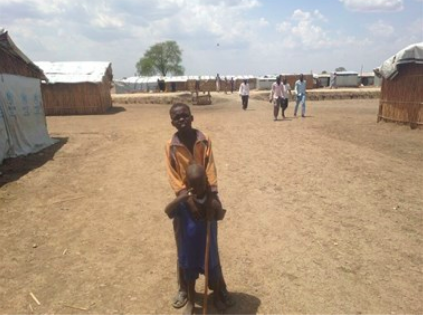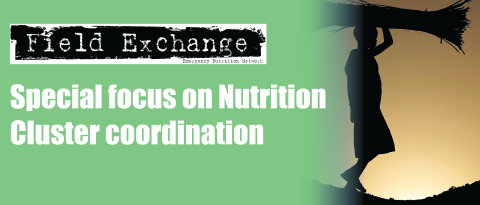Tech RRT Assessment Adviser: Experiences from South Sudan, Mozambique, Iraq and Yemen
By Scott Logue
Scott Logue has been the Assessment Advisor with the Technical Rapid Response Team (Tech RRT) since the project started in the autumn of 2015. He has a Masters degree in Applied Human Nutrition and has acquired extensive assessment experience over the past five years working in various emergency and development contexts.
The findings, interpretations and conclusions in this article are those of the authors and do not necessarily represent the views of USAID/OFDA, UNICEF or others.
South Sudan
Technical area: Assessment
Location: Juba, South Sudan
Period: 3 to 29 Jan 2016; 27 March to 13 May 2016
Requesting agency: Nutrition Cluster
Host agency (in-country): Action Against Hunger
To date there have been two Tech RRT assessment-related deployments in South Sudan, in the first half of 2016, both requested by Action Against Hunger with Nutrition Information Working Group (NIWG) endorsement. These were among the Tech RRT’s first deployments. The main objective of the first deployment was to provide technical and coordination oversight to the NIWG, a sub-group of the Nutrition Cluster. The primary objective of the second deployment was to oversee the implementation of two nutrition surveys and to continue to provide support to the NIWG.
The key deliverables for both deployments included:
- Support to the NIWG in validating surveys submitted to it and strengthening their capacity to undertake this process. This included feedback on several surveys; identification of areas requiring increased capacity within the NIWG; creation of preliminary and final report templates based on SMART methodology templates, tailored to the South Sudan context; and a presentation on the validation of data collection process using Emergency Nutrition Assessment (ENA) for SMART software with sample data sets.
- Assistance to the survey manager in planning the Leer nutrition survey. This included meeting with partners to learn about the context in Leer; support to establish partnerships to implement data collection (to arrange accommodation, transport, government approval, recruitment and security); and support to the survey manager to develop and present the survey protocol and reports.
- Attendance to Integrated Phase Classification (IPC) meetings held in Juba in April 2016 and support to nutrition colleagues to identify priority counties and complete IPC-specific worksheets.
- Presentation of a session to the NIWG on the importance of translating survey questionnaires, using the Bentiu Protection of Civilian (POC) site survey in the Nuer language.
- Provision of support to both Surveillance and Evaluation Team (SET) survey managers for the Guit County and Bentiu POC surveys. Support was provided remotely from Juba and one field visit was carried out for each survey. Support included writing and presenting survey protocols and support for data analysis and report writing.
South Sudan is the only country that the Tech RRT assessment adviser has been deployed to twice. One benefit of a follow-up deployment was to see whether capacity-building activities introduced in the first deployment were being implemented; this visit confirmed that the validation tools and procedures introduced to the NIWG were being used.
Several challenges were encountered during the South Sudan deployments, which were at the beginning of the Tech RRT project. As a result, partners were unfamiliar with the project and on several occasions assumed that the Tech RRT assessment adviser was a staff member of the host agency, Action Against Hunger. On deployment, it was not initially known if Tech RRT advisers would have the capacity to support additional requests such as those coming through the Global Nutrition Cluster (GNC) Helpdesk requests while in-country. In this case, during the second week of the first deployment, the GNC forwarded a request for support to multiple surveys being conducted in besieged areas of Syria. This additional request was initially supported but was then found to be too much on top of deployment activities, so Centre for Disease Control (CDC) was able to provide this additional support that Syria needed.
Logistical challenges were frequent in both deployments. A few days before the start of the training for the Leer survey, it was determined that staff could no longer stay at the previously agreed accommodation and limited vehicles were available. Both issues were resolved. Vehicles were also a concern at the Bentiu POC survey due to limited availability and those that were available were prone to breaking down during data collection.
Obtaining up-to-date population figures for the assessment was difficult due to recent population displacement. This was compounded by the fact that some areas were under the control of the Sudan People’s Liberation Movement-in-Opposition (SPLM-IO) while others were under government control. The survey managers met with the appropriate individuals to obtain demographic figures, but once in the field it was determined that the population figures provided were overestimated in many clusters.
There were also several unforeseen delays throughout the training and data collection phases of the assessments. These delays included staff strikes, adverse weather conditions, security problems and vehicle breakdown. In future, additional days must be included into the planning when conducting assessments in South Sudan.

Mozambique
Technical area: Assessment
Location: Maputo, Mozambique
Period: 12 June to 6 August 2016
Requesting agency: Nutrition Cluster
Host agency (in-country): UNICEF
The objective of the deployment to Maputo was to build the capacity of response stakeholders in the design, implementation, analysis and reporting of nutrition assessments (including the Technical Secretariat for Food Security and Nutrition (SETSAN) assessment) and advise on the overall strengthening of routine data management in line with the needs and requirements of the emergency nutrition response. This was to be done in coordination with the Ministry of Health (MoH) and the Nutrition Cluster.
The key deployment deliverables included:
- Leading anthropometric demonstration sessions at national level (for use of mid-upper-arm circumference (MUAC), weight and height) and leading and performing an analysis for an 11-province, MUAC-only, standardisation test.
- Creation of a template that was used during partner data quality checks, which were used throughout the data collection process for the SETSAN assessment.
- Facilitation of provincial training sessions for six provinces on the collection of data from SETSAN colleagues so that ENA plausibility checks could be performed.
- Provision of preliminary data analysis for all six drought-affected provinces and final results reports for Tete, Manica, Gaza and Inhambane provinces.
- Creation of a document titled Road Map for Strengthening Future SETSAN Assessments with urgent recommendations for all nutrition partners and government colleagues based on observations and best practice.
One of the original deliverables of the deployment was to lead all phases of an assessment in one of the provinces. However, this was changed in order to provide additional support for the SETSAN assessment.
There were some challenges during the deployment. Quality issues had been found with previous SETSAN assessments and it took a significant amount of time and various proposals before an agreed plan was reached with the Nutrition Cluster to improve the quality of data collected. This delay can partly be attributed to the Tech RRT adviser not being able to meet with the cluster as a group until a couple of weeks after arrival, despite significant effort by the Nutrition Cluster Coordinator to do so; the Nutrition Cluster had just recently met and was not practical to reconvene so quickly, further complicated by a changeover in the Nutrition Sector Coordinator. . Language barriers also presented a challenge at times as the Tech RRT adviser could not speak Portuguese and several background documents were not available in English.
Iraq
Technical area: Assessment
Location: Erbil, Iraq
Period: 23 November 2016 to 4 February 2017
Requesting agency: UNICEF
Host agency (in-country): UNICEF
The main objective of the deployment to Erbil was to provide technical support on assessments and build the capacity of stakeholders involved in the humanitarian response to the Mosul crisis. Support involved planning and leading a nutrition survey in internally displaced persons (IDP) camps, established as a result of the crisis. The requesting agency was UNICEF, in their role to support the emergency response, particularly as the Nutrition Cluster was not activated and coordination was instead located in a technical working group within the Health Cluster.
The key deployment deliverables included:
- Creation of the survey protocol and support to UNICEF and MoH for questionnaire development.
- Provision of enumerator survey training for MoH and UNICEF staff and leading the data collection, data entry, nutrition analysis and reporting/presenting of the nutrition-related results from the IDP camps surveyed.
The rapidly changing population of all six IDP camps in the period leading up to data collection (most increasing in population; two decreasing) presented a key challenge during deployment. The selection of clusters was therefore necessarily delayed until only a few days before data collection to ensure a representative sample. This made it difficult to submit a plan for security and checkpoints that left sufficient time in advance of data collection. In addition, camps were located up to two hours travel away from Erbil and security protocol required that teams returned to the Erbil checkpoint by 4pm each day.
See also the article in this issue of Field Exchange that describes experiences from the perspectives of the IYCF-E and social behavior change communication (SBC) Tech RRT advisers during their deployment during the same period to Iraq.
Yemen
Technical area: Assessment
Location: Sana’a, Yemen
Period: 30 April to 31 May 2017
Requesting agency: Nutrition Cluster
Host agency (in-country): Action Against Hunger
The objective of the deployment was to strengthen the overall emergency nutrition response by building the capacity of response stakeholders in the design, implementation, analysis and reporting of nutrition assessments at national and sub-national level. This was accomplished by providing technical support and capacity building to the Assessment Working Group (AWG), a sub-group of the Nutrition Cluster.
The key deployment deliverables included:
- Creation of a database of Yemen nutrition assessments based on the GNC Nutrition assessment template.
- Facilitation of a workshop by the Tech RRT assessment adviser with AWG partners to determine priority indicators and accompanying questions to include in all governorate-level nutrition assessments as part of the development of a Yemen standard SMART survey questionnaire.
- Facilitation of a two-day Yemen Nutrition and Mortality Guideline workshop and creation of the Yemen National Guidelines for Conducting Integrated Anthropometric and Mortality Surveys, which is currently in the process of being validated.
There were a few challenges with this deployment. Due to the delay in receiving a visa (this took four months) and circumstances beyond the control of the Tech RRT, the deployment could only be for approximately one month. As a result, the terms-of-reference (TOR) deliverables had to be modified and a great deal of remote support was required post-deployment. It took a lot of time to gather the required information to determine what demographic data to use for cluster and household sampling for nutrition and mortality surveys in Yemen. It became evident early in this process that there would likely be slightly different sources for urban and rural settings. The information-gathering process included several meetings with AWG colleagues and the United Nations Office for the Coordination of Humanitarian Affairs (UNOCHA), as well as colleagues who attended the two-day Yemen Nutrition Survey Guideline workshop. All this information was consolidated and is now included in the Yemen National Guidelines for Conducting Integrated Anthropometric and Mortality Surveys. While this deployment increased capacity of the AWG and created momentum for appropriate processes around surveys, the Tech RRT assessment adviser will continue to provide remote support for several more months using a capacity strengthening approach to solidify their new skills and knowledge.
For more information, contact: Scott Logue


